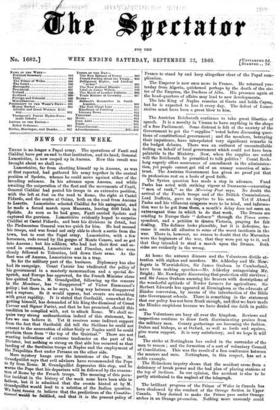NEWS OF THE WEEK.
THERE is no, onger a Papal army. The operations of Fanti and Oialdini have put an end to that institution, and its head, General Lamoriciere, is now cooped up in Ancona. How this result was brought about we shall see.
Lamorieiere, far from shutting himself up in Ancona, as was at first reported, had gathered his army together in the central position of Spoleto, whence he could move against either of the invading columns. In his advance upon Ancona, and while awaiting the cooperation of the fleet and the movements of Fanti, General Cialdini had posted his troops in an extensive positiOn, with the left at Jesi on the road to Rome, the right at Castel Fidardo, and the centre at Osimo, both on the road from Ancona to Loretto. Lamoricdre selected Cialdini for his antagonist, and he made a forced maroh upon Maaerata, leaving 600 Irish in Spoleto. As soon as he had gone, Fanti carried Spoleto and captured the garrison. Lamoriciere evidently hoped to surprise Cialdini at Castel Fidardo, and beat his divisions in detail, but the Piedmontese General was too quick for him. He had massed his troops, and was found not only able to cheek a sortie from the town, but to rout the Papal army. Lamorieiere, with a few horsemen, rode round by the gorges of Monte Conero and so got into Ancona ; but his soldiers, who had lost their first and se- cond in command, Lamorieiere and Pimodan, and who were closely followed to Tolentino, laid down their arms. As the fleet was off Ancona, Lamoriciere was in a trap.
So far the military part of the business. Diplomacy has also had its campaign. Count Cairotir hai vindicated the policy-of his government in a masterly memorandum and a special de- spatch, and-Europe has-approved, for the French Minister alone has quitted Turin. M. Grandgaillot, following up the censure in the Aleniteur, has " disapproved" of Victor Emmanuel's policy; but there is, as he says, a long way between disapproval and a rupture. So it would appear, but events are marching with great rapidity. It is stated that Garibaldi, somewhat for- getting himself, has demanded of his King the dismissal of Count Cavour and Signor Farini, and that he has promised, should this condition be complied with, not to attack Rome. We shall re- quire very strong authentication indeed of this statement, be- fore we can believe it. Yet it receives some indirect support from the fact that Garibaldi did tell the Sicilians he could not consent to the annexation of either Sicily or Naples until he could proclaim them from " the top of the Quirinal." There are not wanting indications of extreme tendencies on the part of the Dictator, but nothing so strong on that aide has occurred as that landing of .the Sardinian troops at Naples and the employment of the Neapolitan fleet under Persano en the other side. More mystery hangs over the intentions of- the Pope. M. Graudguillot says that evil advisers have recommended the Pope to fly from Rome. M. Grandguillot deprecates this step, and he warns the Pope that his departure will be followed by.the evacua- tion of Rome by the French troops. The meaning.of this pecu- liar incident in the history of the week none have been able to. fathom, hut it is admitted that the events hinted at by M. Grandguillot would lead to a solution of the Italian question.' We have reason to believe that the predictions of the Constitu- tionnel would be fulfilled, and that it is the present policy of
France to stand by and keep altogether clear of the Papal com- plication.
The Emperor is now once more in France. He returned yes- terday from Algeria, quickened perhaps by the death of the xis; ter of the Empress, the Duchess of Alba. His presence again at the head-quarters of affairs may lead to new developments.
The late King of Naples remains at Gaeta and holds Carta, but he is expected to lose it every day. The defeat of Lamc4- riciere must have been a great blow to him.


























